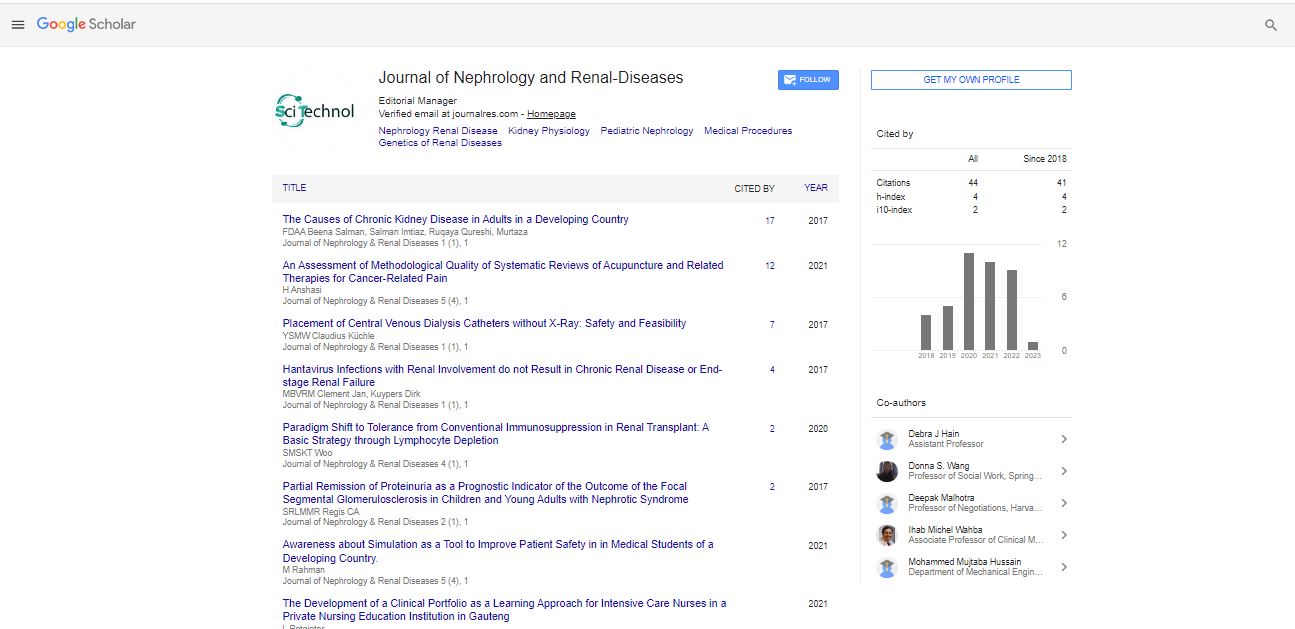About the Journal

Journal of Nephrology & Renal Diseases (JNRD) is an Open Access, peer-reviewed Journal dedicated to publish most complete and reliable source of information on basic and clinical aspects of Nephrology. The Journal aims to promote rigorous research findings in the field of clinical nephrology pertaining to renal diseases, associated novel therapeutics developments and clinical research
Submit manuscripts to the Editorial Office at Online Submission System or publisher@scitechnol.com
Journal of Nephrology & Renal Diseases primarily focuses on the topics, but not limited to:
- Renal Biology
- Kidneys: Physiology & Functions
- Pediatric Nephrology
- Kidney Diseases or Nephropathy
- Diagnosis, Treatment & Medical Procedures
- Pathophysiology of Renal Diseases
- Genetics of Renal Diseases
- Renal Failure
- Diabetic Nephropathy
- Renal Immunology
- Renal Medicine
- Renal Replacement Therapy
- Renal Transplantation
- Renal Pharmacology
Any article pertaining to Nephrology will be considered. Review processing is performed by the editorial board members of Journal of Nephrology & Renal Diseases or outside experts; at least two independent reviewers approval followed by editor approval is required for acceptance of any citable manuscript. Authors may submit manuscripts and track their progress through the system, hopefully to publication. Reviewers can download manuscripts and submit their opinions to the editor. Editors can manage the whole submission/review/revise/publish process.
Renal Biology
The kidneys are the fundamental organs of the urinary framework. They are bean shaped organs, each about the measure of a clench hand that serve a few vital administrative parts in vertebrates. They are found just underneath the rib confine, one on every side of the spine. Consistently, the two kidneys channel around 120 to 150 quarts of blood to deliver around 1 to 2 quarts of pee, made out of squanders and additional liquid.
Related Journals on Renal Biology:
Journal of Nephrology and Therapeutics, Open Journal of Nephrology, Journal of Nephrology, International Urology and Nephrology, The Open Urology and Nephrology Journal, World Research Journal of Nephrology.
Kidney Functions
The kidneys function as filters of the body by removing waste products and excess material. These are removed through urine. They also perform few functions like removing drugs from the body, balancing body’s fluids, release hormones that regulate blood pressure, etc.
Related Journals on Kidney Functions:
Nephrology Dialysis Transplantation, Indian Journal of Nephrology, The Internet Journal of Nephrology, Nephron, Medicine - Physiology, BMC Urology, Hong Kong Journal of Nephrology.
Pediatric Nephrology
It is the division of Nephrology that is specialized in the diagnosis and treatment of children with acute and chronic diseases like hypertension, hematuria, proteinuria, renal tubular acidosis, nephrolithiasis, glomerulonephritis and kidney failure. It additionally looks after pediatric patients with end-stage kidney disease, patients undergoing peritoneal dialysis, hemodialysis and follow-up care after kidney transplantation.
Related Journals on Pediatric Nephrology:
Pediatric Nephrology, The International Journal of Pediatric Nephrology, Journal of Clinical Pediatric Nephrology, Pediatric Emergency care and medicine, Current Opinion in Pediatrics, Nephron Experimental Nephrology, Advances in Chronic Kidney Disease.
Kidney Diseases
As we know that kidneys remove waste products from our body through urine with the help of nephrons, the tiny structures present with in kidneys that filter the blood. Most of the diseases attack nephrons, which makes kidneys unable to remove wastes and thus leading to diseases. The diseases are of two types, acute and chronic diseases.
Related Journals on Kidney Diseases:
World Journal of Nephrology, Clinical Journal of the American Society of Nephrology, Nephron Experimental Nephrology, Clinical Nephrology and Urology Science, International Journal of Nephrology and Renovascular Disease, Indian Journal of Nephrology, BMC Nephrology, Advances in Chronic Kidney Disease.
Diagnosis for Kidney Diseases
Kidneys play vital role in the body by removing waste. There are few tests to measure the kidney functions such as blood tests, imaging tests, urine tests, etc.
Related Journals on Diagnosis for Kidney Diseases:
Clinical Nephrology, Clinical Journal of the American Society of Nephrology, The Internet Journal of Nephrology, Indian Journal of Nephrology, Clinical Medicine Insights: Urology, BMC Nephrology, Advances in Chronic Kidney Disease, Kidney International.
Renal Failure
It is the condition where the kidneys fail to filter metabolic wastes from blood. There are numerous causes of kidney failure, and treatment of the underlying disease may be the first step in correcting the kidney abnormality. Some causes of kidney failure are treatable and in some cases it’s untreatable. The two main forms of kidney failure are acute kidney injury and chronic kidney disease.
Related Journals on :
Nature Clinical Practice Nephrology, BMC Urology, Advances in Renal Replacement Therapy, Pediatric Nephrology, Journal of Renal Nursing, The Internet Journal of Nephrology, Year Book of Nephrology, Hypertension, and Mineral Metabolism, Advances in Chronic Kidney Disease.
Diabetic Nephropathy
Nephropathy implies kidney ailment or harm. Diabetic nephropathy is damage to your kidneys brought about by diabetes. In extreme cases it can prompt kidney damage. The kidneys have many tiny blood vessels that filter waste from your blood. High blood sugar from diabetes can destroy these blood vessels. Over time, the kidney isn't able to do its job as well leading to kidney failure.
Related Journals on Diabetic Nephropathy:
Year Book of Nephrology, Hypertension, and Mineral Metabolism , Advances in Nephrology, Forum Nefrologiczne, Journal of Urology & Nephrology, Kidney International, Clinical Nephrology, Journal of Diabetes and its Complications, Advances in Chronic Kidney Disease.
Renal Replacement Therapy
Renal replacement therapy (RRT) is therapy that replaces nonendocrine kidney function in patients with renal failure which includes acute kidney injury and chronic kidney disease. Renal replacement therapy includes dialysis, hemofiltration and hemodiafiltration. It also includes kidney transplantation, which is the ultimate form of replacement of old kidney with the donor kidney.
Related Journals on Renal Replacement Therapy:
Nephrology Dialysis Transplantation, Hong Kong Journal of Nephrology, Advances in Renal Replacement Therapy, Clinical Journal of the American Society of Nephrology, World Journal of Nephrology, Forum Nefrologiczne, Nephron Experimental Nephrology, Journal of Nephrology.
Renal Medicine
Nephrology is a specialty of medicine and pediatrics that concerns itself with the study of normal kidney function, kidney problems, the treatment of kidney problems and renal replacement therapy. Renal Medicine offers the challenge of looking after both acutely ill patients and those with a chronic disease.
Related Journals on Renal Medicine:
Kidney International, OA Nephrology, American Journal of Nephrology, Clinical Medicine Insights: Urology, Clinical Medicine: Urology, Nature Reviews Nephrology, The Open Urology and Nephrology Journal, Kidney and Blood Pressure Research.
Kidney Transplantation
A kidney transplant is an operation in which a person with kidney failure receives a new kidney. The new kidney takes over the work of cleaning the blood. There are two types of kidney transplants: those that come from living donors and those that come from unrelated donors who have died (non-living donors).
When kidney fails, there are three treatment choices:
1. hemodialysis 2. peritoneal dialysis 3. kidney transplantation
Related Journals on Kidney Transplantation:
World Journal of Nephrology, Hong Kong Journal of Nephrology, Clinical Journal of the American Society of Nephrology, Nephron Experimental Nephrology, Nephrology Dialysis Transplantation, Journal of Nephrology, Nephrology Reviews, Turkish Nephrology, Dialysis, and Transplantation Journal , Excerpta Medica - Section 28: Urology and Nephrology, Forum Nefrologiczne, Kidney and Blood Pressure Research.
Treatment for Kidney Diseases
When the disease attacks nephrons, the kidneys fail to work. Depending on the underlying cause, some types of kidney disease can be treated. But kidney damage can continue to worsen in few cases. In such cases the treatment complications can include high blood pressure medications, medications to lower cholesterol levels, medications to treat anemia, dialysis, kidney transplant, etc.
Related Journals on Treatment for Kidney Diseases:
OA Nephrology, Nature Reviews Nephrology, International Journal of Nephrology and Renovascular Disease, Clinical Nephrology, Journal of Renal Injury Prevention, Journal of Renal Nursing, Indian Journal of Nephrology, BMC Nephrology, Journal of Urology & Nephrology, Medicine - Physiology, Advances in Chronic Kidney Disease.
Pathophysiology of Renal Diseases
Hypertension is one of the leading causes of CKD due to the deleterious effects that increased BP has on kidney vasculature. Long-term, uncontrolled, high BP leads to high intraglomerular pressure, impairing glomerular filtration. Decreased renal function interferes with the kidneys’ ability to maintain fluid and electrolyte homeostasis. The ability to concentrate urine declines early and is followed by decreases in ability to excrete phosphate, acid, and potassium.
Related Journals on Pathophysiology of Renal Diseases:
American Journal of Kidney Diseases, American Journal of Nephrology, Aktuelle Urologie, BMC Nephrology, International Journal of Nephrology and Renovascular Disease, British Journal of Renal Medicine, Clinical Medicine Insights: Urology, Clinical Medicine: Urology, American Journal of Physiology - Regulatory, Integrative and Comparative Physiology.
Renal Immunology
Immunological processes are implicated in many renal diseases. In several situations, diagnosing and treating immunological processes can halt or reverse renal impairment. The immunological tests can include: ANCA, Anti glomerular basement membrane, ANA, Serum and urine electrophoresis, C3, C4.
Related Journals on Renal Immunology:
Experimental Nephrology, Journal of the American Society of Nephrology, Nephron, World Journal of Nephrology, Nature Clinical Practice Nephrology, Clinical Nephrology, World Journal of Hypertension, World Journal of Clinical Urology.
Renal Pharmacology
In pharmacology the elimination or excretion of a drug is understood to be any one of a number of processes by which a drug is eliminated from an organism either in an unaltered form or modified as a metabolite. The kidneys are the principal organs for excreting water-soluble substances.
Related Journals on Renal Pharmacology:
World Journal of Critical Care Medicine, Fundamental & Clinical Pharmacology, Acta Pharmacologica Sinica, Clinical Medicine: Urology, American Journal of Pharmacology and Toxicology, Journal of Urology & Nephrology, Forum Nefrologiczne, Journal of Epithelial Biology & Pharmacology, Pharmacological Research, American Journal of Nephrology.
Fast Editorial Execution and Review Process (FEE-Review Process):
Journal of Nephrology & Renal Diseases is participating in the Fast Editorial Execution and Review Process (FEE-Review Process) with an additional prepayment of $99 apart from the regular article processing fee. Fast Editorial Execution and Review Process is a special service for the article that enables it to get a faster response in the pre-review stage from the handling editor as well as a review from the reviewer. An author can get a faster response of pre-review maximum in 3 days since submission, and a review process by the reviewer maximum in 5 days, followed by revision/publication in 2 days. If the article gets notified for revision by the handling editor, then it will take another 5 days for external review by the previous reviewer or alternative reviewer.
Acceptance of manuscripts is driven entirely by handling editorial team considerations and independent peer-review, ensuring the highest standards are maintained no matter the route to regular peer-reviewed publication or a fast editorial review process. The handling editor and the article contributor are responsible for adhering to scientific standards. The article FEE-Review process of $99 will not be refunded even if the article is rejected or withdrawn for publication.
The corresponding author or institution/organization is responsible for making the manuscript FEE-Review Process payment. The additional FEE-Review Process payment covers the fast review processing and quick editorial decisions, and regular article publication covers the preparation in various formats for online publication, securing full-text inclusion in a number of permanent archives like HTML, XML, and PDF, and feeding to different indexing agencies.

